Editorial
Editorial: John Pepper Clark-Bekederemo (1935-2020)

On Tuesday, October 13, 20202, one of Nigeria’s literary giants, the iconic John Pepper Clark-Bekederemo (FNAL, NNOM) passed into the ancestral world which he had so poignantly captured in his creative works. In compliance with his wish ‘If Moslems can do it in a day/You certainly can do it in three/ as expressed in the poem ‘My Last Testament’, he was buried within three days in his home town, Kiagbodo without fanfare, in a simple ceremony witnessed by family and close friends. It was a dramatic curtain call for a man of drama who orchestrated his own funeral while alive!
Clark, renowned poet, critic, editor, playwright, and teacher penned works which dominated Nigeria’s literary space for decades. Who, for example, can forget his cryptic capture of the great city Ibadan in that eponymous poem ‘Ibadan? While many of his works explore the ideological, cultural, and spiritual dimensions of his native Ijaw ethnicity, they are also studied for their engagement with the socio-political and economic realities of Nigeria. The conditions expressed in his timeless poem “Night Rain” capture the crippling indigence that confronts millions of Nigerians. The poem, “Streamside Exchange” relives the cyclical nature of time in infinity.
It is a reminder of how Nigerian politicians continue to recycle themselves even when they no longer have the steam to paddle the ship of State. Indeed, the departed literary icon was a man who saw tomorrow. Born in 1935 in Kiagbodo (he later revised the date to 1930 stating that there was evidence that he was born in that year), he grew up in the creeks. In 1948, he was admitted to Government College Ughelli for his secondary education. While there, he distinguished himself as a budding scholar with exceptional essay writing skills. After his secondary school education, he sought to serve in the Nigeria Army in 1954. During the military officers training in Enugu, after meeting other intellectual requirements, he was rejected on account of his height.
For a young, promising man who had a lot of hope in his country, this rejection demoralized him. He was employed as a junior clerk in the Cabinet Secretariat of the Colonial administration in Lagos. He worked for a year from 1954-1955, when he was admitted to the University College Ibadan to study English and the Classics. In Ibadan, he met Christopher Okigbo with whom he shared radical, intellectual ideas. While Clark excelled in both poetry and drama, Okigbo was more of a poet. At Ibadan, Clark honed his editorial skills by editing two different magazines, The Beacon and The Horn. In 1960, Clark graduated from the University College Ibadan with a BA in English and got a job as Information Officer in the Western Region’s Ministry of Information. In 1961, he relocated to Lagos where he worked as Editor of Daily Express Newspaper.
He held the position until 1962 when he travelled to the US as a Parvin Fellow at Princeton University. Upon his return from Princeton University in 1963, he served as a Research Fellow at Institute of African Studies, University of Ibadan. While there, he researched and collected materials with which he wrote the globally acclaimed The Ozidi Saga. In 1965, Clark joined the University of Lagos as a Lecturer Grade One where he met Wole Soyinka with whom he developed a strong affinity, literary interests, and friendship. Within seven years of joining the University of Lagos, he rose to become a Professor of English, the first African to be appointed in that position anywhere in the world.
He eventually headed the Department of English University of Lagos. In 1986, Clark, Chinua Achebe and Wole Soyinka marched to Dodan Barracks to persuade the then military Head of State, General Ibrahim Babangida to spare the life of a fellow poet, Mamman Vatsa who was accused of plotting a coup. Although Babangida assured the trio that Vatsa’s life will be spared, later that evening General Domkat Bali announced that Vatsa had been executed. This incident was a major reason Clark shunned political events in Nigeria.
As the great poet, and dramatist takes a final bow, we urge the federal government to accord him some honour by naming an institution after him. Given his contributions to education and cultural renaissance in Nigeria, Clark deserves to be celebrated by all. A situation where national cultural ambassadors are not celebrated sends a wrong signal to the polity. Delta State government honoured him in his lifetime by donating a building in his honour to Faculty of Arts of University of Lagos. As he sails away into the other world, using as berth his resting place beside Kiagbodo River, we can only wish the grand old man bon voyage. May God console his spouse Professor Ebun Clark and all the children! Adieu our dear JP!
-
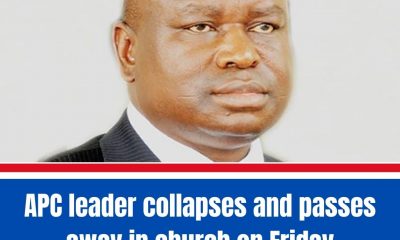
 Politics6 days ago
Politics6 days agoAPC leader collapses and passes away in church on Friday
-

 Gist1 day ago
Gist1 day agoMy Boss Used To ‘KNACK’ My Wife After Sending Me On A Mission, To The Extent She Got… – Ex-soldier
-

 News3 days ago
News3 days agoFake Reverend Sister Arrested With 38 Children
-
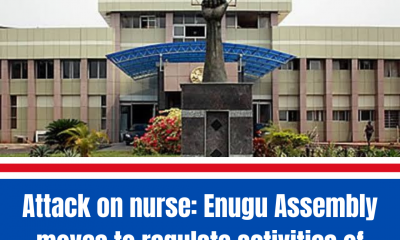
 News6 days ago
News6 days agoAttack on nurse: Enugu Assembly moves to regulate activities of masquerades
-

 News7 days ago
News7 days agoLocal Content, Local Fraud
-
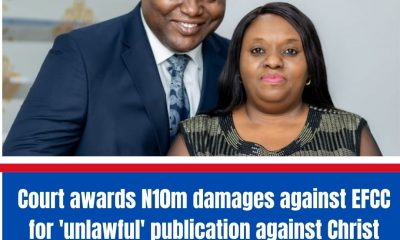
 News7 days ago
News7 days agoCourt awards N10m damages against EFCC for ‘unlawful’ publication against Christ Embassy Pastor Miebi Bribena and wife
-
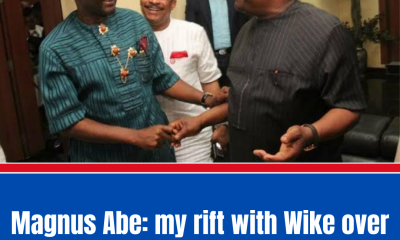
 Politics6 days ago
Politics6 days agoMagnus Abe: my rift with Wike over
-
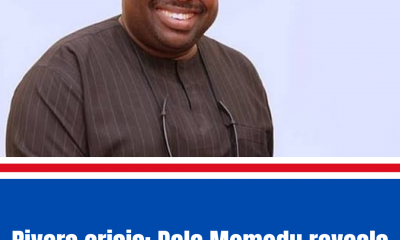
 Politics6 days ago
Politics6 days agoRivers crisis: Dele Momodu reveals cause of fight between Wike, Fubara




